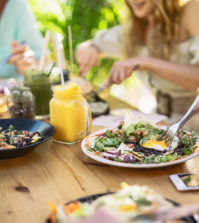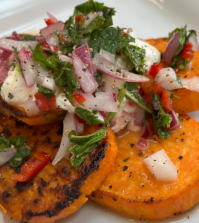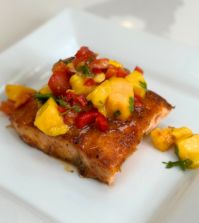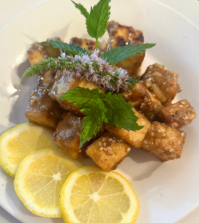- Finding Unshakable Power in a World That Wants to Pull Us ApartPosted 5 months ago
- What could a Donald Trump presidency mean for abortion rights?Posted 5 months ago
- Financial Empowerment: The Game-Changer for Women in Relationships and BeyondPosted 6 months ago
- Mental Health and Wellbeing Tips During and After PregnancyPosted 6 months ago
- Fall Renewal: Step outside your Comfort Zone & Experience Vibrant ChangePosted 6 months ago
- Women Entrepreneurs Need Support SystemsPosted 7 months ago
Holiday Hooch: How to Make Drinking Alcohol More Healthful
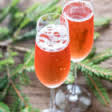 Written by Andrea Donsky from NaturallySavvy.com
Written by Andrea Donsky from NaturallySavvy.com
Along with all the tempting food available during the holidays, there’s something else many people like to indulge in: alcohol. Whether it’s eggnog, your cousin’s potent punch, or other cups of cheer, it’s easy to get caught up in the festivities and be sidelined by the spirits.
Alcoholic beverages can be a delightful complement to whatever you are eating or doing during the holidays. But some alcoholic beverages, including special holiday cocktails, can catch you off-guard, sneaking in extra calories, causing hangover symptoms, and making you feel less than joyful.
So before and after you raise your glass or pop a cork, check out these tips on how to make drinking alcohol a healthier experience.
Be wary of wine
If you are a wine drinker (I am!), you will want to be aware of several features of your chosen beverage. Wine contains sulfites (sulphites), which are a natural byproduct of the fermentation process during wine making. These sulfur compounds are a preservative against bacteria and yeast. Because naturally occurring sulfites last only up to a few months, winemakers add extra to their brews.
Sulfites have been associated with headache and allergic reactions in some people, especially asthmatics. Most research indicates a 3 to 10 percent prevalence of sensitivity to sulfites among asthmatics. Otherwise, few studies have looked specifically at wine and headaches. Those that do, indicate that red wine, but not sparkling or white wines, can trigger headache and migraine in less than 30 percent of people.
Aside from sulfites, headache symptoms may be the result of the histamine and tyramine that are present in wine, as these substances affect blood pressure and can lead to headaches. Alcohol is dehydrating, which may also contribute to headaches.
When drinking wine, you can reduce your chances of getting a headache by having a seltzer with lemon or a tall glass or iced coconut water before your first glass of wine and then another seltzer or coconut water after. This way you can stay better hydrated and help ward off headache and hangover symptoms. If you want to limit your exposure to sulfites, you can look for organic wines and those labeled “sulfite-free,” although they will have a small amount of naturally occurring sulfites.
Eat for success
Before imbibing, be sure to eat foods that will help slow down the rate at which you absorb alcohol. These include foods that provide healthy fats, such as fish, coconut oil, extra virgin olive oil, nuts, and seeds, as well as foods rich in protein, such as cheese, nuts, seeds, fish, and beans. Snacking on these foods while you are drinking alcohol can help as well, but stay away from salty nuts and seeds, because they will increase your thirst!
Don’t begin drinking on an empty stomach! The alcohol will irritate your digestive system and also cause you to absorb the alcohol more quickly.
Mind your meds
Medication and liquid holiday cheer often don’t mix. Even over-the-counter acetaminophen or ibuprofen can have a detrimental impact on your liver if you mix them with alcohol. Check with your healthcare provider or pharmacist before you drink alcohol if you are taking any medications.
Have hangover remedies ready
Just in case you get carried away a bit during the festivities, you should have a few hangover remedies ready.
A recent study found that red ginseng can be an effective remedy for a hangover. The study was conducted in 25 healthy men who drank 100 mL of whisky (40% alcohol) with either 100 mL water or 100 mL of a red ginseng drink.
Blood samples taken until four hours after the men drank showed that those who took the herbal remedy had significantly lower plasma alcohol concentrations and expiratory alcohol concentration than the men who drank the water. Overall, red ginseng had positive effects on symptoms of hangover.
Some more traditional hangover handlers include water, fruit juices, and eggs. Water helps rehydrate your body while fruit juices provide hydration as well as fructose, which reportedly may increase the rate at which you can rid your body of toxins (e.g., acetaldehyde) that are a byproduct of alcohol metabolism. Eggs are rich in cysteine, an amino acid that helps the liver break down acetaldehyde to a harmless substance.
Read more about hangover remedies
Drink in a certain order…or not
Perhaps you’ve heard one of the following adages:
“Beer after wine and you’ll feel fine; wine after beer and you’ll feel no cheer”
And the complete opposite:
“Wine after beer have no fear, beer after wine, ain’t so fine.”
So which one is true? No scientific studies validate either claim, so it’s likely up to the individual and how much one drinks. Since moderation is always recommended, we hope you will not overdo it and thus never have to worry about this question! Moderation is generally defined as one drink daily for women and two for men.
One drink is equal to:
12 ounces of beer
8-9 ounces of malt liquor
5 ounces of wine
1.5 ounce of 80 proof liquor
 Andrea Donsky
Andrea Donsky
Founder and Editor-in-Chief of NaturallySavvy.com. She is passionate about living a natural and organic lifestyle and reading food labels. She is a mom to three beautiful children who love ground flaxseed & fish oil.
As a pioneer and visionary in the health food industry, Andrea Donsky’s passion is to inspire people to make enlightened choices for healthy living. Andrea has combined her background and expertise as both a Registered Holistic Nutritionist, and an entrepreneur, to educate the public on living an organic and non-GMO lifestyle through the creation of her businesses, books, articles, videos, speeches, and media appearances. Among her numerous publications, Andrea co-authored Unjunk Your Junk Food published by Simon & Schuster, as well as two e-books entitled “Label Lessons: Your Guide To A Healthy Shopping Cart,” and “Label Lessons: Unjunk Your Kid’s Lunch Box.”
Andrea Co-hosts Naturally Savvy Radio on RadioMD.com, a live show every Wednesday. She appears regularly as a healthy living expert on TV and radio across North America. Her segments have aired on all major networks including NBC, ABC, CBS, Fox, Univision, WGN, Better TV, City TV, CTV, CBC, and Global.
– See more at: http://naturallysavvy.com/bios/andrea-donsky#sthash.W7YD6h56.dpuf


